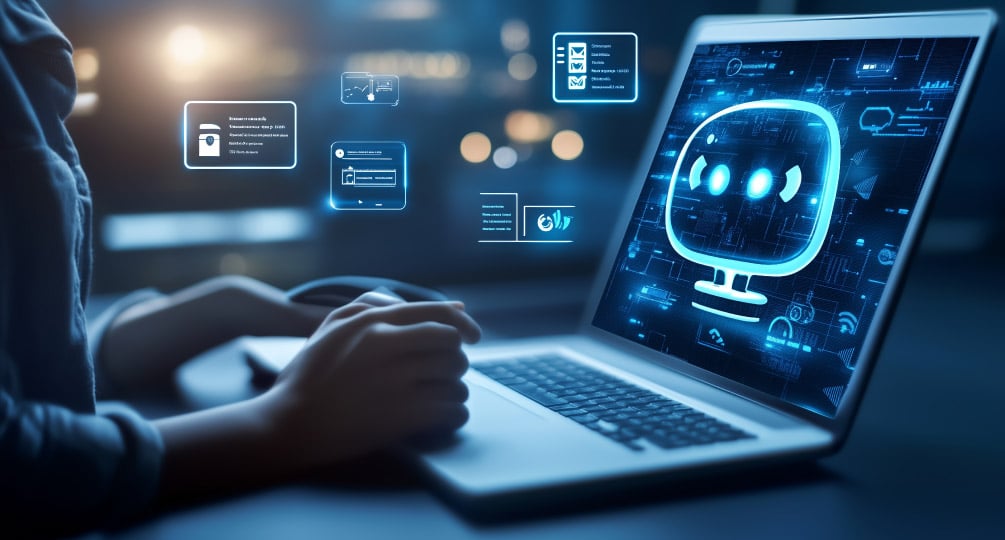Are you struggling to manage your workflows in the modern business environment? Then this is the right time to adapt AI chatbots to automate your business process.
The implementation of workflow automation has certainly gained momentum over the years. Unlike the traditional use of chatbots that were used solely for assisting users over basic FAQs, they have made great strides to become self-sufficient virtual assistants that can elevate whole productive interchanges with their capabilities to manage multiple systems at once.
This article covers all you need to know about how AI Chatbots is changing workflow automation for good, along with an understanding of their importance for contemporary professionals.
What is Workflow Automation?
Workflow automation refers to the process of using software or tools to automate repetitive tasks to streamline their business processes. As these workflow automation tools eliminate repetitive tasks, they can reduce human errors and operation time. These tools allow resources to focus more on valuable tasks that help boost team performance and overall productivity of businesses.
Workflow automation focuses on process efficiency related to human inputs, especially the reduction of manual work through technology systems in business systems automation. It seeks minimization or total removal of human input so as to enhance operational efficiency within an organization.
A type of automation which bits on business systems is termed workflow automation. It attempts minimization or total removal of human input to boost process efficiency all through the reducing manual effort technology provides on business systems.
Historically, automation processes needed the assistance of IT departments to set up and maintain; this caused support to be strictly governed by workflows. Workflows were not user friendly, simple processes that required too much companionship. Advanced workflow systems have become user-friendly and powered by technologies like AI which foster elasticity and responsive improvement of workflows.
In modern contexts, agility is critical in staying ahead and responding to automation needs strengthens a business’s competitive position. Businesses need supportive frameworks that enable reduction of time-consuming tasks and empower workforce realignment to strategic activities.
Understanding AI Chatbots
AI chatbots are software tools which integrate modern AI technology as nature language processing (NLP) and machine learning (ML) to interact with humans through conversation. More sophisticated than basic scripted chat bots, AI chatbots understand context and respond appropriately to varying inputs.
They can interpret phrases, determine meaning, and provide precise replies or perform functions. More advanced bots also “remember” earlier interactions so they can respond better during new conversations.
With NLP and ML, coupled with intelligent memory, AI chatbots are able go beyond customer care roles to more complex workflows like management of processes activation of triggers execution at different levels strategy decision ass inflation in real time.
The Role of AI Chatbots in Workflow Automation
- Task Automation: You can automate data entry, resource allocation, scheduling meetings, and generating reports at set intervals. By automating these repetitive tasks free up a significant number of hours spent on manual work.
- Making Instant Decisions: AI bots can fetch data from other systems, analyze the integrated information, and make real-time decisions workflows like approving requests or escalating issues based on set rules or learned patterns.
- Enhancing Team Collaboration: AI-powered chatbots linked to Slack or Microsoft Teams serve as workflow managers reminding team members about deadlines while assigning and tracking tasks without supervision ensuring responsibility handed over is upheld.
- Cross System Collaboration: Integration with CRMs, email software, help desks, HR systems among many others makes it possible for chatbots to execute tasks across silos which aids in streamlining task execution improving data accuracy and visibility.
Key Benefits for Modern Business
Enabled tech automation impact different business objectives because companies achieve more goals with fewer resources thanks to agile intelligent bots that offer an array of benefits above traditional methods; fundamentally changes these operations once made manually simple automations handled by bots provide advanced level services surpassing standard protocol procedures followed in previous eras.
- Strategic Focus: With processes made more efficient through automation that handles repetitive menial work concurrently done by machines relieves employees enabling real strategy formation recalls innovation powered plans.
- Quicker Completion: Automation allows for completing tasks without the need for human prompts.
- Constant Availability: With no need to break, chatbots can execute processes continually.
- Reduced Expenses: Less manual work needing to be done and fewer mistakes made leads to costing significantly less.
- Flexible Capacity: As AI chatbots become more advanced, they enable businesses to grow by managing more tasks without the need for additional staff.
Challenges and considerations
Implementing AI chatbots in workflow automation comes with its distinct challenges:
Integration of Legacy Systems – Outdated systems often do not accommodate newer chatbot technologies and may require custom integrations or upgrades.
Training for Accuracy – Effectiveness is reliant on domain-specific training, and poorly trained bots can lead to confusion or inefficiencies.
Over-Automation Risk: Not every process should be automated, creating an over-reliance on technology. Striking the right balance between automation, human interaction, and input is essential.
Security and Privacy – Businesses must protect sensitive information managed by chatbots, adhering to stringent regulations while enforcing cybersecurity protocols.
Conclusion
AI-enabled chatbots are capable of automating workflows more effectively and agile than ever before in ways that give previously rigid systems unprecedented flexibility.
They enable transforming work processes through basic everyday function automation extending to complex cross-platform workflows which allows them to join as essential digital team members rather than mere tools used for attending to workflows.
Proactive AI-driven automation will provide powerful automation responding immediately along increasingly digital enabled activity across sectors at scale, enhancing operational efficiency driving dynamic competitiveness need innovation necessitating strategy shifts on investment priorities sharply redefining where value is placed.
